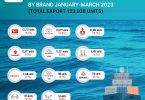 MAKASSAR— The Association of Indonesian Automotive Industries (GAIKINDO) responded cautiously to the government’s plan to issue a revised regulation on the Financial Services Authority, POJK No. 29 / POJK.05 / 2014 concerning the operation of a finance company business. One of them is the application of zero percent down payment for the purchase of motorised vehicles.
MAKASSAR— The Association of Indonesian Automotive Industries (GAIKINDO) responded cautiously to the government’s plan to issue a revised regulation on the Financial Services Authority, POJK No. 29 / POJK.05 / 2014 concerning the operation of a finance company business. One of them is the application of zero percent down payment for the purchase of motorised vehicles.
GAIKINDO Chairman Yohannes Nangoi said that until now there are yet no clear requirements regarding which finance companies could use this policy (DP 0 percent). A study is still being carried out by GAIKINDO regarding the planned issuance of this new regulation. “Until now, I don’t know yet. If that is only one of the conditions which states the non-performing finance (NPF) maximum of one percent, there is still something else, we are still trying to explore it,” Nangoi said in Makassar, Tuesday, 21 August 2018.
He continued, with a 0 percent DP, automotive businessmen must be more careful in issuing credit policies to consumers. Filing must be done more rigorously, so as to minimise the risk of credit failure. “It will definitely stimulate the industry, but must be careful, especially in the commercial vehicle segment. Each company must have its own fortress to ensure the flow of credit,” he said.
The government, through the Financial Services Authority (OJK), will issue a rule on 0 percent down payment, for the purchase of motorised vehicles. The regulation will be stated in the revised POJK No. 29 / POJK.05 / 2014 concerning the operation of a finance company business. Of course there are conditions that are met, where the finance company has a bad level of traffic or non-performing loans below one percent.
A cautious measure was also conveyed by Chairman I GAIKINDO Jongkie D Sugiarto. “The cheap DP is not always positive, finance companies (leasing / banks) must also be careful, because once the credit is busted, the remaining debt is still large. While the value of the motorised vehicle is not necessarily able to cover the remaining debt, so the risk is big,” said Jogkie. “If a lot of credit is problematic, there will be many used cars ang it can disrupt the new car market,” he continued.
Provisions for advances are indeed handed over to finance companies, where if prospective customers can be trusted regarding financial matters, the DP can be smaller. “Usually this DP is determined by a finance company (leasing) or bank. If the prospective customer isbona fide, usually the DP can be smaller,” said Jongkie.
Fiddling with the determination of the amount of DP for the purchase of motorised vehicles is not only done recently. Previously in 2015, Bank Indonesia had time to provide concessions. At that time, it refers to Bank Indonesia Regulation (PBI) No 17/10 / PBI / 2015 concerning the ratio of loan to value (LTV) or the ratio of financing to value, for credit or property financing and advances for credit or motor vehicle financing. The BI regulation gave a little breath about the DP’s provisions, from the previous ones stipulated in theBank Indonesia Notificantion 15/40 / DKMP dated September 24, 2013. But this time the allowances given were quite tempting to 0 percent.
Previously, Stanley Setia Atmadja, MUF’s President Director, was of the same opinion as GAIKINDO. “For multi-finance companies, it depends on the ability whether the operations can handle low down payments or not,” Stanley said.
Stanley added, if it had been implemented then there would certainly be more challenges. Because, with a zero percent down payment, the underwriting and collection team’s capabilities must be better prepared. “Because of course there will be more applications coming in, without having to pay down payments,” he said. (*)







